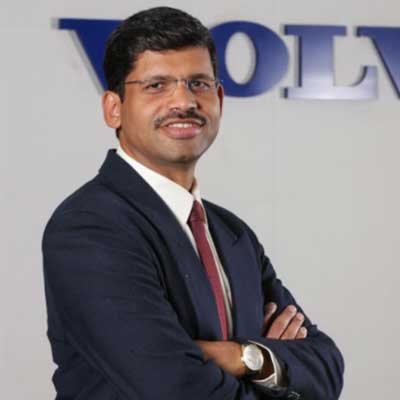

The world is entering an age of robotics. Industrial robots have worked in the manufacturing sector for decades. Construction could be the next industry to undergo an automation transformation. Recent advances have made autonomous heavy machinery a viable option for construction teams.
At Volvo Construction Equipment (Volvo CE), innovation is at the core. With over 180 years of construction and innovation expertise, the company is at the forefront of technological development. Dimitrov Krishnan, Managing Director, Volvo CE India, who was recently appointed as the President of Indian Construction Equipment Manufacturers Association (ICEMA), summed up the discussion on whether machine automation will ever take off in construction.
During a conversation with Pratap Padode, Founder and Editor-in-Chief, Equipment India, Krishnan pointed out three mega trends that will change the face of the automobile and construction equipment business. These include: electro mobility, connectivity and automation. “Electro mobility is yet to see traction in the automobile industry. Although in the western market, electro mobility in the smaller equipment has already started. Volvo is one of the companies that has launched small excavators, loaders, etc., which are 100 per cent electric. However this is yet to happen in India. Even in the European and American markets, electro mobility is still in the early stages,” said Krishnan.
He added, “Semi automation has started to get good traction in the western world, particularly in the machine control systems. So, even if you have workers with less skill, you can still achieve maximum results through this system. Full automation is happening only in specific sectors, and is not yet happening in full steam.”
Speaking on connectivity, Krishnan had this to say: “Connectivity is the technology where you will see clear traction, not only for analysing equipment but also to improve efficiency in operations. Fleet optimisation, fleet efficiency, etc. will see clear traction in the coming one or two years. Construction industry has started to use these technologies now.”
“Without connectivity, electro mobility or automation is not possible. However, in the next 10 years, all these technologies will find their way into India,” said Krishnan.
Caring for the environment and playing an active, responsible role in society have always been important to Volvo CE. Added Krishnan, “The industry is moving towards cleaner engines, and has moved from BSIII to BSIV engines. Almost 60 per cent of what we sell is going into next-generation emissions, which will help out pollution levels caused by the machines to much lower levels. This is a huge change in technology. Obviously it costs more in the product side, but it is also a product that will consume lesser fuel as compared to the previous generation, and will give far better quality.”
Krishnan thinks that Volvo is moving in the right direction. “We also have off-highway equipment, which is still not being regulated. We need to bring them at par with the new engines. We are working with the government in this regard to implement it in the next 3 to 3.5 years. We also plan to replace a fairly large part of our products with BSIV engines by the end of this year.”
“Many of the corporates have signed up for the sustainability journey. Volvo is committed towards the Paris Agreement, and all the corporates have pledged towards this initiative. You can see that new products that are being launched are already adhering to this,” said Volvo’s Managing Director.
On the impact of cancellation of leading exhibitions like Excon, Krishnan said that these exhibitions are just forums where the whole industry comes together, and each and every company is under one roof. “Though we do have strong sales in those months. But I wouldn’t say that it has impacted the industry volumes as such because the demand has always been very strong. We have exhibitions at the time when the demand was strong. This year in March we witnessed tremendous sales despite no exhibition. All the new product launches this year have taken place virtually. Of course, we did miss exhibitions, but it did not have a major impact on the sales.”
Speaking on the impact of Covid-19 on the sales, Krishnan said, “Last year (2020) was a complete washout, and we did not have any sales to show off. This year (2021) has been better. In fact, we may end up with a very strong year as a lot of road projects have been sanctioned by the government. Covid second wave had slowed things down a little. However, now we are seeing that our customers are getting into decision making. They are waiting for the rains to slow down so that they can take the deliveries.”
“We will see a strong business opportunity between September and December and all the way into March next year. Construction activity picking up will have a direct impact on the construction equipment business,” concluded Krishnan.